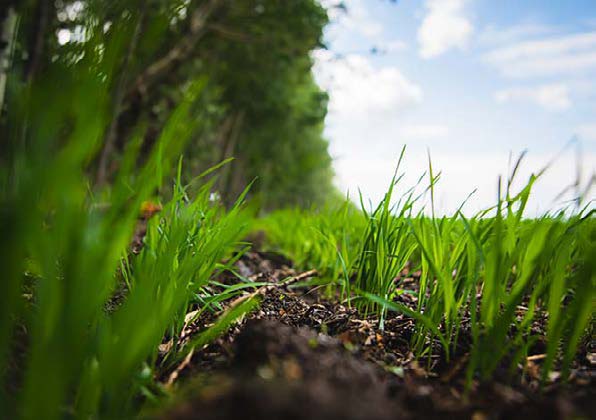When it comes to asking permission to hunt a landowner’s property, it’s important to be prepared. Don’t go in expecting instant approval in exchange for nothing more than a smile. While this does happen sometimes, there are unspoken “rules” to consider when hunting someone else’s land.
Hunting leases and the “pay-to-play system” don’t exist in Canada as they do in the United States. In fact, both of these American norms are actually illegal in the Great White North. This means that the only way to access some of the best “honey pots” available is by building a relationship with enough trust for a landowner to allow you to hunt their property.
The obvious first rule is to actually ask permission in the first place. Poaching someone else’s property is not cool. It can lead to hefty fines as well as potentially dangerous confrontations with landowners. Asking someone to hunt their land is not hard if you go in well prepared.
Before we start, I want you to put yourself in the landowner’s shoes. I hear far too many times from fellow hunters that “landowners are impossible,” or “they are so selfish,” or “they probably just want to hunt it themselves.” Here’s the thing to remember folks: It’s their land. Just for a moment, close your eyes and picture the doorbell ringing. You go to the door, curious about who could be knocking. It’s two large guys, dressed in camo, empty-handed, diesel still running in the driveway, and it’s getting dark. They want to use your backyard with lethal weapons when you aren’t home.
Thoughts?
Now picture them in the middle of the day, dressed in business casual, hats off at the door. They take a step back as they ring the doorbell and the truck is parked neatly in line with the other vehicles. They introduce themselves, hand over a business card, and explain that they are hoping to access your land for some hunting opportunities. They know your last name and your neighbors’ names.
A little different experience, eh?

When Is Best to Ask?
This should go without saying, but don’t go up to a landowner’s door fully dressed and ready to hunt the day of, or the day before the season opens. While you may get permission in some rare circumstances, it’s better to reach out weeks or months prior.
Most people don’t like making spur-of-the-moment decisions and will find it easier to just say no than to deal with the stress of not having enough time to consider the request. I always leave a card with my contact info in case they want to reach out later or do some digging about me on their own.
How to Present
People make judgments about you based on first impressions, usually within seven seconds of meeting you. So, first impressions are important. I mentioned this earlier, but don’t show up in full camo gear ready to hunt. Arrive like you would for a job interview. I’m not saying you need to wear a suit and tie, but go in looking presentable and trying to make a good impression. Don’t leave your diesel running with the brights shining in the doorway. Be sure you shower, put on clean clothes, and use some manners, damn it! Believe it or not, folks can feel pretty intimidated when others show up unannounced, especially in today’s day and age. I don’t even like it when the pizza guy rings my doorbell (and I’ve invited him, plus he has pizza)!
Would you be more inclined to trust someone who looked disheveled or someone who was well-groomed and wearing clean clothes? If a person doesn’t look like they can look after themselves, it doesn’t give a positive impression of reliability, and it is also a direct reflection of how they may treat the property.
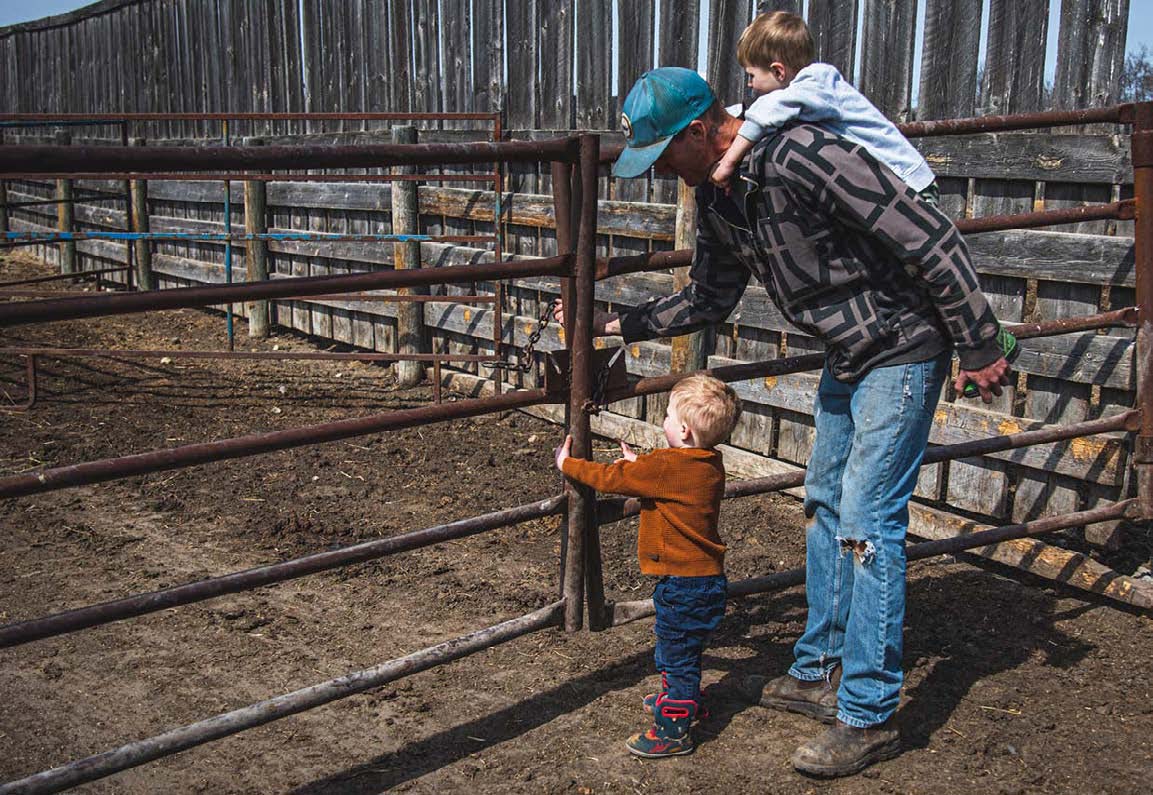
Offer to Help
You’ve got two feet and a heartbeat. Offering to help farmers check fence lines, fix barbed wire, lend a hand during calving season, etc. goes a long way toward showing that you understand the uneven nature of the relationship. A landowner really gains nothing from allowing hunters on their property, so it’s up to you to create that value.
If a farmer seems on the fence, remember that you have the opportunity to add value. Perhaps suggest shed hunting the fields in the spring to save some tractor tires, or perhaps help with predator control. Coyotes can be a problem for landowners. Offering to help out in that department may just be a hard offer to turn down. This way, trust can be built in the off-season, and you can prove yourself a trustworthy individual who isn’t just taking from the relationship.
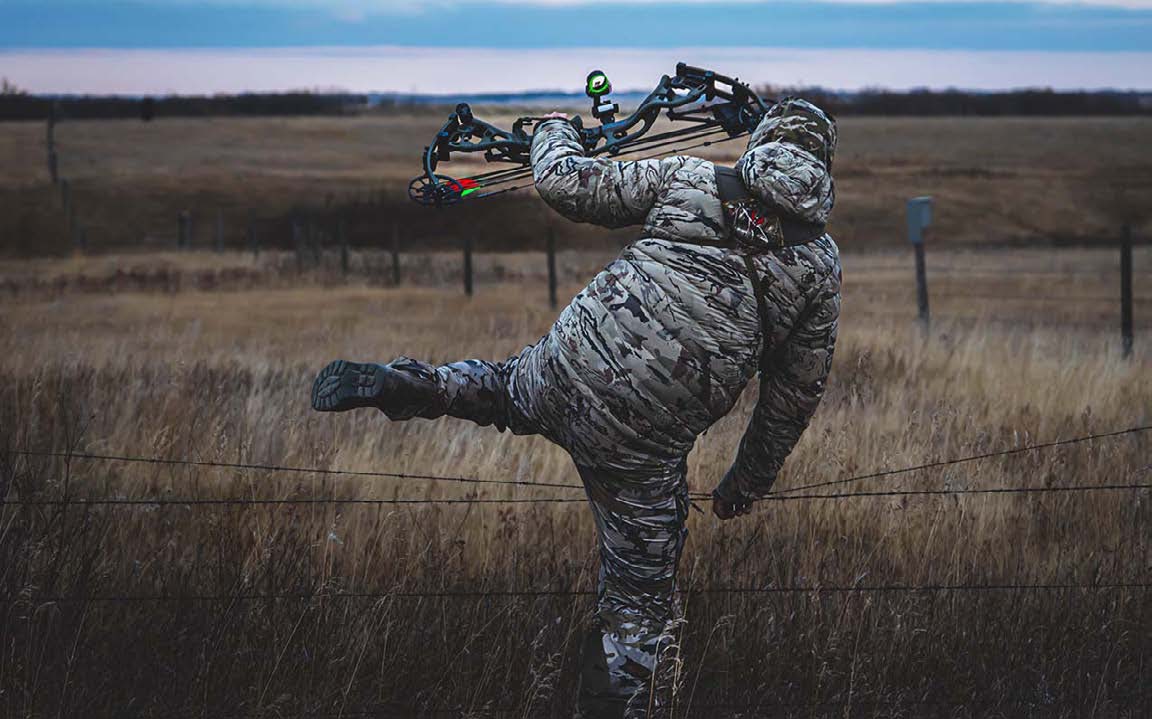
Bring Gifts
I’ve brought freshly baked bread, jam, whiskey, beer, etc. to a new farm or property. Showing up empty-handed is awkward. Plus, if the landowner says no right away, you’ve left them a little reminder of what a stand-up person you are for when they are ready to reconsider. Who knows, maybe when they put that jam on their toast or have a sip of whiskey by the fire, they may just change their mind.
Don’t Expect a Yes
Do not necessarily expect a yes, and always be polite regardless of the answer This is a big one, folks. Remember that this is not your land and there can be a myriad of factors as to why a landowner may not grant permission. Perhaps they have kids who enjoy playing in the forest and so having a hunter on the property makes them anxious. There are also lots of people who disagree with hunting animals and so will simply not be interested. That is their right as landowners, so be respectful and understanding. Always thank these folks for their time, be polite and gracious, and offer them your number should they change their minds.

It’s a Yes!
Gaining permission and keeping permission are two totally different things. It’s really important to remember that once permission is granted, the work to build a trusting relationship has only just begun. Here are a list of questions you should consider prior to even stepping foot on someone’s land to hang a stand.
- Offer to help on the farm. How can you help them? What value are you adding?
- What fields or woods can I hunt?
- Do you allow other hunters?
- Are trail cameras ok?
- Vehicle access? Can you drive through fields? Where should you park?
- Sharing meat? Do they want some?
- What crops are they planting? (if a farm)
- Do they want to know every time you plan on accessing the property?
- Do they want to know if you take an animal?
- What species are they ok with you harvesting?
- Should I leave a spare key for my vehicle?
- Would you like me to reach out to any farmers leasing the land?
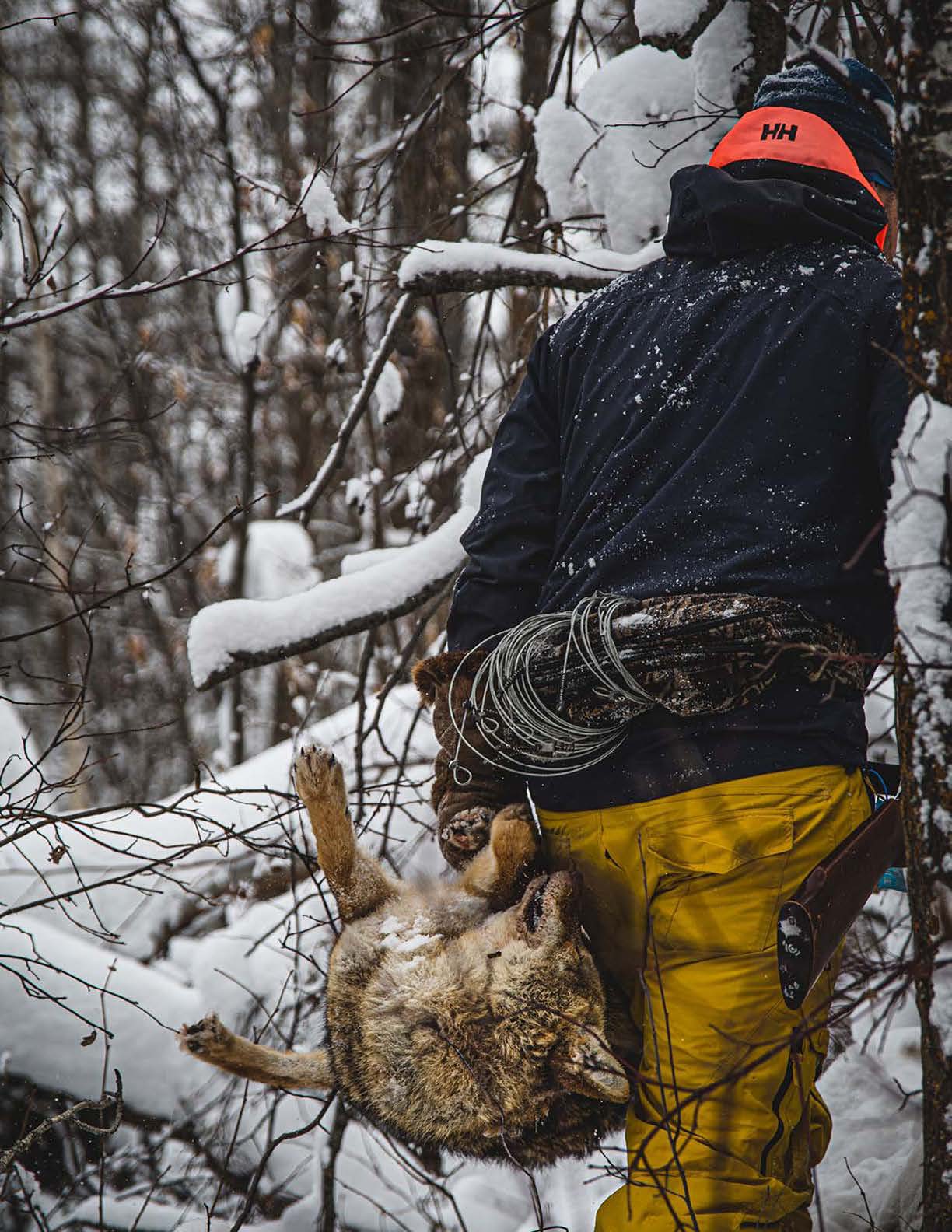
Time + Effort
Building the relationship takes time and effort. I’m always sure to drop off thank-you cards detailing what I took away from the season, the joy their land was able to provide, the experiences and moments I was able to take away. A little tug at the heartstrings and some insight as to why you do what you do can go a long way.
As wild as it sounds, this next tip may have been my most successful yet. It’s gotten me into some spots that I know haven’t been accessed for 20-plus years. Bring a waiver.
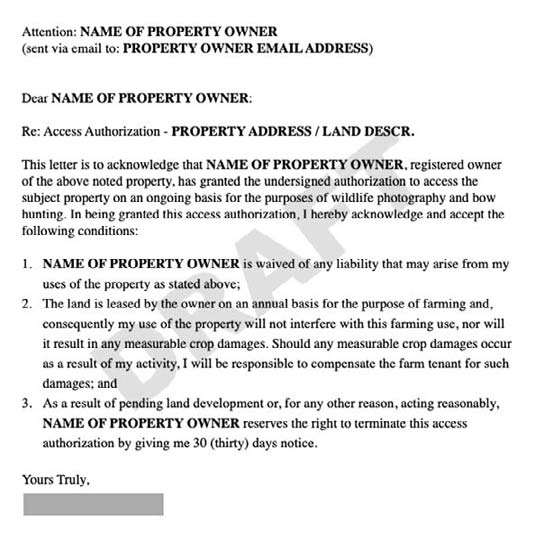
A waiver shows that you are willing to try and level the playing field a little bit for the landowner. One of the main reasons landowners don’t like granting permission is fear of someone getting injured on their property. It’s tough to be liable for a stranger’s actions. Remember…not everyone hunts. I once had a landowner who was hellbent on the thought that I was going to shoot the farmer he leases the land to off his tractor with my bow. As crazy as that sounds I had to calmly explain the range of a bow and the decision-making that goes into creating an ethical shot. A waiver shows you are willing to absolve the landowner of any responsibility (including shooting farmers off of tractors). It allows you to also have them think about the decision, review the waiver, and see what a responsible person you must be to have the foresight and drive to put that concept together.
I truly believe that putting in the time to gain access to prime locations has been a real deal-maker for me. I used to hunt properties I hoped deer were on because I already had permission. Once I actively started using maps, scouting in the summer, then strategically asking for permissions, my hunting experience went from a 5 to a 10. At the end of the day, you have to hunt where the animals are—and that’s not always going to be your favorite tree stand on your in-laws’ farm.
So, get out there. Start knocking. Permission season has already started.
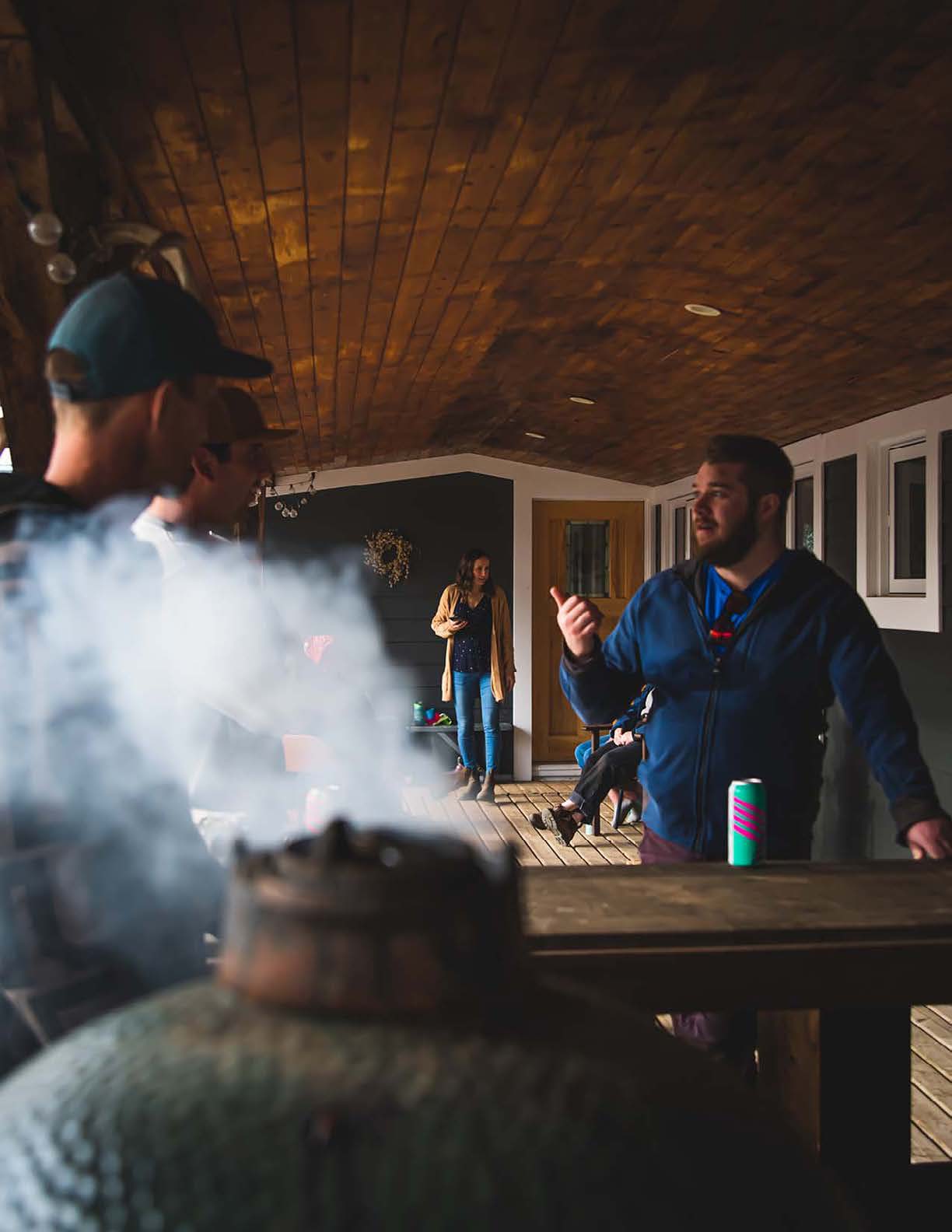
Per our affiliate disclosure, we may earn revenue from the products available on this page. To learn more about how we test gear, click here.



